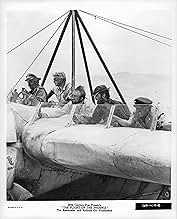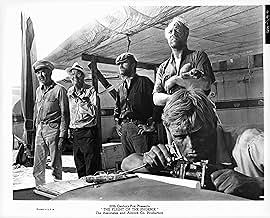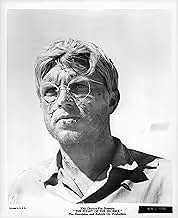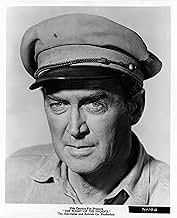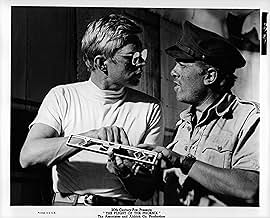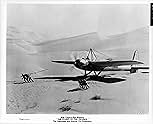Dopo un incidente aereo nel Sahara, uno dei sopravvissuti dichiara di essere un progettista aeronautico e che è possibile creare un aereo funzionante dal relitto.Dopo un incidente aereo nel Sahara, uno dei sopravvissuti dichiara di essere un progettista aeronautico e che è possibile creare un aereo funzionante dal relitto.Dopo un incidente aereo nel Sahara, uno dei sopravvissuti dichiara di essere un progettista aeronautico e che è possibile creare un aereo funzionante dal relitto.
- Regia
- Sceneggiatura
- Star
- Candidato a 2 Oscar
- 6 candidature totali
Hardy Krüger
- Heinrich Dorfmann
- (as Hardy Kruger)
Chris Alcaide
- Arab Leader
- (non citato nei titoli originali)
Stanley Ralph Ross
- Arab Singer
- (voce)
- (non citato nei titoli originali)
Recensioni in evidenza
Edwin Aldrin the second man to walk on the moon was asked once if he was in his spacecraft and his engine quit running and he was going to die in an hour how would he spend that last hour? He replied `I'd work on the engine.' This film essentially is about that same type situation. A cargo plane with passengers aboard goes down in the Arabian Desert and the survivors quickly come to the realization that they eventually will be found but probably by that time they will be dead. One of the passengers says he can build a flyable plane out the existing wreckage and they can save themselves. However he's never taken on a project quite this large before.
There are a number of little subplots with the characters to include a hard-nosed pilot, his booze guzzling co-pilot, a British Army sergeant who has a dislike for officers, A by the book British Army officer, A doctor, A mental patient, A cynical oil field worker, an accountant, and so forth. It's somewhat of an all star cast so it helps the picture. Although a little long the film is intriguing. The only damper on this movie is that Paul Mantz a superb pilot was killed in the making of it.
There are a number of little subplots with the characters to include a hard-nosed pilot, his booze guzzling co-pilot, a British Army sergeant who has a dislike for officers, A by the book British Army officer, A doctor, A mental patient, A cynical oil field worker, an accountant, and so forth. It's somewhat of an all star cast so it helps the picture. Although a little long the film is intriguing. The only damper on this movie is that Paul Mantz a superb pilot was killed in the making of it.
"The Flight of the Phoenix", based on the Elleston Trevor novel, has little more than one set and no costume changes; and the action is confined to the few yards around an airplane crashed in the desert. Yet its story is more gripping than most "action" movies.
An old airplane owned by an oil company crashes at the hands of a crusty old pilot (James Stewart) whose bitterness and fatalism are brought out when he's forced to admit the crash was due to pilot error. His half-alcoholic navigator has insured that the plane was off course, and cannot be discovered by rescue craft (if any); he's a nice guy and becomes the mediator between the rancorous passengers and crew, but he lacks self-confidence (Richard Attenborough in a finely understated performance). The passengers include a company accountant (Dan Duryea); a shell-shocked employee (Ernest Borgnine, by turns touching and silly) sent home in the company of his doctor (Christian Marquand); a straight-laced British officer (Peter Finch) and his mutinous sergeant (Ronald Fraser); several oil company employees, including one who is always making vicious jokes at the expense of the others (Ian Bannen); and a German "designer" (Hardy Kruger) who went to the oil fields to visit his brother.
Stranded in the desert with no hope of rescue, they debate various schemes for salvation, all of which fail, until Kruger tells the others he is an airplane designer and he has discovered a way to build a new plane from the spare parts of the old one. All it needs for a handful of unskilled men, living on a little water and no food but pressed dates, coping with unbearable heat during the day and unbearable cold at night, to transform themselves into aircraft manufacturers before they all succumb.
All performances are good. Some of the actors (George Kennedy, the always interesting Dan Duryea) are woefully underused -- perhaps large segments of their roles wound up on the cutting-room floor. The major tension is the confrontation between Stewart's old-school pilot and Kruger's technologically self-righteous engineer (at one point, Stewart's character makes the incredibly prescient remark that one day the little men with their slide-rules and computers will inherit the earth).
Even when they all decide they'd rather attempt building the new plane with hope than sit around watching each other die, new surprises spring up that compromise the whole thing.
The script and the acting are solid, especially James Stewart in a different and challenging role. The music is sometimes overwhelming, and stings give unnecessary emphasis to some lines. Also of interest is the listing in the credits of "The Love Theme" which seems like a silly thing to call it.
A superlative story of men living on the ragged edge of survival, working together but not necessarily getting along or surrendering their own values.
An old airplane owned by an oil company crashes at the hands of a crusty old pilot (James Stewart) whose bitterness and fatalism are brought out when he's forced to admit the crash was due to pilot error. His half-alcoholic navigator has insured that the plane was off course, and cannot be discovered by rescue craft (if any); he's a nice guy and becomes the mediator between the rancorous passengers and crew, but he lacks self-confidence (Richard Attenborough in a finely understated performance). The passengers include a company accountant (Dan Duryea); a shell-shocked employee (Ernest Borgnine, by turns touching and silly) sent home in the company of his doctor (Christian Marquand); a straight-laced British officer (Peter Finch) and his mutinous sergeant (Ronald Fraser); several oil company employees, including one who is always making vicious jokes at the expense of the others (Ian Bannen); and a German "designer" (Hardy Kruger) who went to the oil fields to visit his brother.
Stranded in the desert with no hope of rescue, they debate various schemes for salvation, all of which fail, until Kruger tells the others he is an airplane designer and he has discovered a way to build a new plane from the spare parts of the old one. All it needs for a handful of unskilled men, living on a little water and no food but pressed dates, coping with unbearable heat during the day and unbearable cold at night, to transform themselves into aircraft manufacturers before they all succumb.
All performances are good. Some of the actors (George Kennedy, the always interesting Dan Duryea) are woefully underused -- perhaps large segments of their roles wound up on the cutting-room floor. The major tension is the confrontation between Stewart's old-school pilot and Kruger's technologically self-righteous engineer (at one point, Stewart's character makes the incredibly prescient remark that one day the little men with their slide-rules and computers will inherit the earth).
Even when they all decide they'd rather attempt building the new plane with hope than sit around watching each other die, new surprises spring up that compromise the whole thing.
The script and the acting are solid, especially James Stewart in a different and challenging role. The music is sometimes overwhelming, and stings give unnecessary emphasis to some lines. Also of interest is the listing in the credits of "The Love Theme" which seems like a silly thing to call it.
A superlative story of men living on the ragged edge of survival, working together but not necessarily getting along or surrendering their own values.
I have seen this film maybe, 20 times over the last 30 years. It's one of the rare movies that entertains each and every time. Seeing movies like Flight Of The Phoenix only reminds me just how bad "Hollywood" has gotten.
The plot. It is quite simple really. Survival. But how the writers, producers and directors mold the basic premise into a complex and compelling 2 hours of cinema is a delight.
To watch Stewart, Finch, Attenborough, Kruger and company work in this movie is to see the difference between actors of yesteryear and movie stars of today.
I am watching the movie as I type this and I'm watching Attenborough react to finding out Kruger's "secret". His laughter is both hilarious and pitiable. And the look of shock and confusion on Stewart's face says it all.
As you can tell, I love this movie. I cannot vote it or recommend it highly enough. You would be well served to find this on DVD. Enjoy and happy flying.
The plot. It is quite simple really. Survival. But how the writers, producers and directors mold the basic premise into a complex and compelling 2 hours of cinema is a delight.
To watch Stewart, Finch, Attenborough, Kruger and company work in this movie is to see the difference between actors of yesteryear and movie stars of today.
I am watching the movie as I type this and I'm watching Attenborough react to finding out Kruger's "secret". His laughter is both hilarious and pitiable. And the look of shock and confusion on Stewart's face says it all.
As you can tell, I love this movie. I cannot vote it or recommend it highly enough. You would be well served to find this on DVD. Enjoy and happy flying.
"Flight of the Phoenix" (1965) is a survival story about a group of men who crashland in the Libyan desert. A German airplane designer (Hardy Krüger) amongst them suggests utilizing the workable remains of the wreckage to create a new Frankenstein plane, "The Phoenix," and fly out. Although his scheme is initially perceived as mad they soon realize it might be their only legitimate way out.
Even though "Flight" is a survival adventure it's just as much a drama since the setting is stationary (a relatively small area of desert) and there's very little opportunity for action, except the occasional punch or two. The action here is the tension between the men. First and foremost there's pilot Towns' friction with the Kraut airplane designer, Dorfmann. Towns (James Stewart) is a man of old-fashioned practicality whereas Dorfmann is a visionary. Between the two is Towns' assistant, Moran (Richard Attenborough), who understands & likes Towns but sees the genius of Dorfmann.
A stiff-upper-lipped British officer and his sergeant provide more tension. The officer always seems to make the quasi-heroic decision that, while admirable on the surface, is usually the dumbest choice. The sergeant realizes this and is stuck between a rock and a hard place. Does the British Army's chain of command mean anything in such a survival situation? Should he follow this boneheaded officer to a premature grave in the name of respect and loyalty or should he follow the wiser choices for the sake of survival? Towns despises the sergeant for choosing the latter, but is he really wrong? It's debatable.
Other notables are on hand, like Ernest Bornine, Christian Marquand, George Kennedy and Ian Bannen. Borgnine's excellent as a half-crazed employee sent home in the company of his doctor, played by Marquand. One passenger resorts to constant joking and mocking to cope with the situation (Bannen).
The film runs 2 hours and 22 minutes but the drama is so well-written it doesn't seem that long. Like all great films it pulls you in and holds your attention until the end.
The film was shot, believe it or not, in the desert areas of Imperial County in SE California, as well as Yuma.
DVD INFO: Some whiners complain about the DVD being butchered, etc. but I just viewed it and everything looked great and there were no scenes cut out.
FINAL WORD: "Flight of the Phoenix" is one of the greatest survival adventure-dramas ever made. Although there's a little bit of datedness, the film stands head-and-shoulders above the 2004 remake.
GRADE: A
Even though "Flight" is a survival adventure it's just as much a drama since the setting is stationary (a relatively small area of desert) and there's very little opportunity for action, except the occasional punch or two. The action here is the tension between the men. First and foremost there's pilot Towns' friction with the Kraut airplane designer, Dorfmann. Towns (James Stewart) is a man of old-fashioned practicality whereas Dorfmann is a visionary. Between the two is Towns' assistant, Moran (Richard Attenborough), who understands & likes Towns but sees the genius of Dorfmann.
A stiff-upper-lipped British officer and his sergeant provide more tension. The officer always seems to make the quasi-heroic decision that, while admirable on the surface, is usually the dumbest choice. The sergeant realizes this and is stuck between a rock and a hard place. Does the British Army's chain of command mean anything in such a survival situation? Should he follow this boneheaded officer to a premature grave in the name of respect and loyalty or should he follow the wiser choices for the sake of survival? Towns despises the sergeant for choosing the latter, but is he really wrong? It's debatable.
Other notables are on hand, like Ernest Bornine, Christian Marquand, George Kennedy and Ian Bannen. Borgnine's excellent as a half-crazed employee sent home in the company of his doctor, played by Marquand. One passenger resorts to constant joking and mocking to cope with the situation (Bannen).
The film runs 2 hours and 22 minutes but the drama is so well-written it doesn't seem that long. Like all great films it pulls you in and holds your attention until the end.
The film was shot, believe it or not, in the desert areas of Imperial County in SE California, as well as Yuma.
DVD INFO: Some whiners complain about the DVD being butchered, etc. but I just viewed it and everything looked great and there were no scenes cut out.
FINAL WORD: "Flight of the Phoenix" is one of the greatest survival adventure-dramas ever made. Although there's a little bit of datedness, the film stands head-and-shoulders above the 2004 remake.
GRADE: A
A transport aeroplane carrying an assortment of men crash lands in the Sahara desert, these men must group together in spite of their varying indifference's and build another plane out of the wreckage.
It perhaps, on the surface, doesn't sound much does it? We as viewers are asked to spend over two hours watching these men interact with each other with differing results. The location stays the same, it is just sand, sun, and men awaiting death. Yet the film is one of the best exponents of the character piece because the characters each have their own personal hang ups. Be it carrying scars from the war, or a class difference of upbringing, or that demon addiction to alcohol, these men have to overcome themselves before they can overcome the biggest hurdle in front of them.
Boasting what reads as a who's who of great character actors, The Flight Of The Phoenix becomes a riveting watch because we feel the stifled nature of their plight, because we are blessed to have these wonderful actors fully realising the great writing from Lukas Heller. It is absorbing, it is very sharp, and fittingly we get a twist that makes the ending even more rewarding.
Highly Recommended. 8/10
It perhaps, on the surface, doesn't sound much does it? We as viewers are asked to spend over two hours watching these men interact with each other with differing results. The location stays the same, it is just sand, sun, and men awaiting death. Yet the film is one of the best exponents of the character piece because the characters each have their own personal hang ups. Be it carrying scars from the war, or a class difference of upbringing, or that demon addiction to alcohol, these men have to overcome themselves before they can overcome the biggest hurdle in front of them.
Boasting what reads as a who's who of great character actors, The Flight Of The Phoenix becomes a riveting watch because we feel the stifled nature of their plight, because we are blessed to have these wonderful actors fully realising the great writing from Lukas Heller. It is absorbing, it is very sharp, and fittingly we get a twist that makes the ending even more rewarding.
Highly Recommended. 8/10
Lo sapevi?
- QuizThe Phoenix's take-off was considered too dangerous to stage at the sandy filming location (its actual take-off was from a smoothed, compacted-earth runway), so legendary stunt pilot Paul Mantz was asked to do a "touch-and-go" landing in which he came in low, skimmed his landing gear along the ground, then throttled up to gain altitude, merely simulating a take-off. On the second take, as the landing gear made contact with the ground, the plane's aft boom fractured, causing the aircraft to nose into the ground and cartwheel, killing Mantz. As the second take had merely been a "protection shot," with the necessary footage captured during the first attempt, a vintage North American O-47A observation plane from an air museum was substituted for the remaining necessary close-ups.
- BlooperThe airflow over the wings would be so compromised by the wind shields and the men behind them that the plane would simply not fly. Indeed, the Phoenix stunt plane built for the film suffered severe aerodynamic drag from the dummies that were put on the wing to simulate the passengers. The dummies had to be replaced with thin plywood silhouettes erected parallel to the fuselage that did not obstruct the airflow.
- Citazioni
Heinrich Dorfmann: Mr. Towns, you behave as if stupidity were a virtue. Why is that?
- Curiosità sui creditiClosing credits epilogue: IT SHOULD BE REMEMBERED...
THAT PAUL MANTZ, A FINE MAN AND A BRILLIANT FLYER GAVE HIS LIFE IN THE MAKING OF THIS FILM...
- ConnessioniFeatured in Film Preview: Episodio #1.4 (1966)
- Colonne sonoreThe Phoenix Love Theme
Senza Fine"
Sung by Connie Francis
Music & Italian Lyrics by Gino Paoli
English Lyrics by Alec Wilder
I più visti
Accedi per valutare e creare un elenco di titoli salvati per ottenere consigli personalizzati
Dettagli
Botteghino
- Budget
- 5.355.000 USD (previsto)
- Tempo di esecuzione2 ore 22 minuti
- Colore
- Proporzioni
- 1.85 : 1
Contribuisci a questa pagina
Suggerisci una modifica o aggiungi i contenuti mancanti

Divario superiore
By what name was Il volo della Fenice (1965) officially released in India in English?
Rispondi




